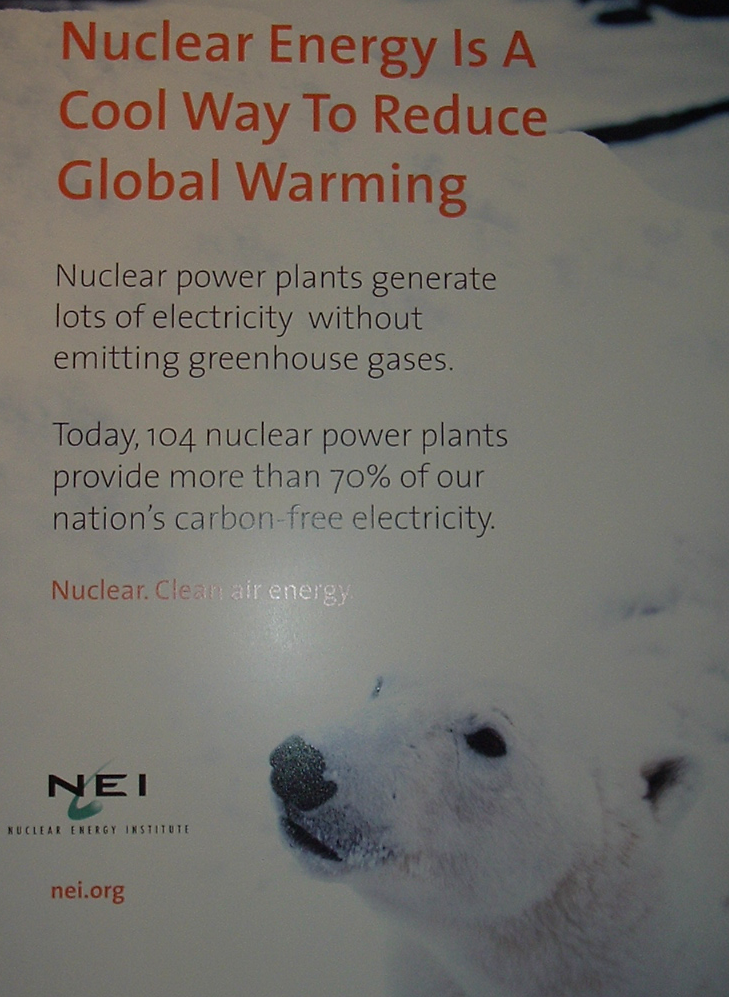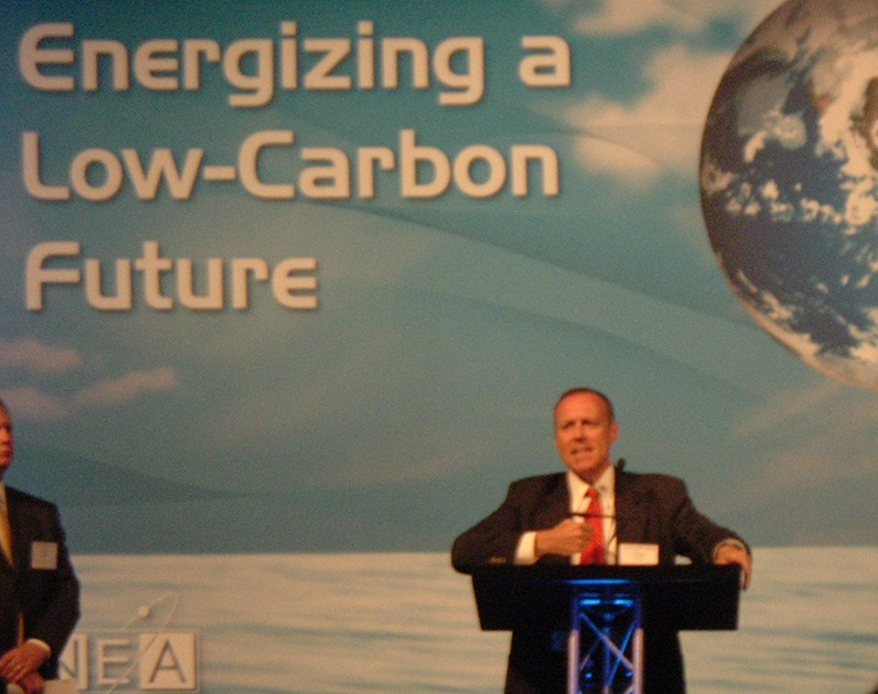Submitted by Diane Farsetta on
 I learned many things at the Nuclear Energy Institute's (NEI's) annual meeting, but perhaps none more surprising than this: When nuclear power executives discuss the state of their industry, they highlight many of the same issues as their environmentalist opponents.
I learned many things at the Nuclear Energy Institute's (NEI's) annual meeting, but perhaps none more surprising than this: When nuclear power executives discuss the state of their industry, they highlight many of the same issues as their environmentalist opponents.
Of course, the emphasis and even the language are different. But presenters at the "Nuclear Energy Assembly," held in Chicago from May 5 to 7, discussed financing for new nuclear plants, nuclear waste storage and nuclear weapons proliferation concerns.
Nuclear power opponents argue that the industry shouldn't expect or need government support, some fifty years into its existence. In a hotel conference room populated mostly with gray-suited older white men, industry executives repeatedly called for an expansion of federal loan guarantees for new nuclear plants.
Early on in the conference, NEI president and CEO Frank L. "Skip" Bowman said, "We use loan guarantees in this country to support ship building, steel making, student loans, rural electrification, affordable housing, construction of critical transportation infrastructure, and for many other purposes. Please don't tell me that America's electric infrastructure is any less important." He added, "I wish someone would tell me when the word 'subsidy' became a slur, a four-letter word. ... What is there of value in American life that is not subsidized, to some extent?"
Nuclear power opponents argue that the radioactive waste generated raises serious environmental, health and safety issues, and the United States still hasn't figured out how to handle the waste from existing plants. At the NEI meeting, there was no "waste," only "spent fuel." And the answer to the storage issue is "recycling" -- not reprocessing -- spent fuel to obtain material that can again be used to fuel reactors.
"You still have a challenge of what to do with used fuel," admitted Craig T. Smith, a principal at the polling firm Penn, Schoen & Berland. "Recycling is a message that resonates with people. ... From a messaging perspective, it resonates with audiences that don't necessarily support, or are somewhat agnostic, with nuclear power."
Furthering the CASE
For me, Smith's talk was easily the highlight of the conference. His firm (which was co-founded by Hillary Clinton's campaign pollster, Mark Penn) has worked for nuclear industry for "several years," to "shape the image of nuclear power in the public policy marketplace," as Smith described it.
"Many of you may have heard of our firm because of the political work we do -- Bill Clinton, Tony Blair, [Silvio] Berlusconi, Michael Bloomberg," Smith explained at the beginning of his presentation. "But actually, 80 percent of the work we do is for corporations, and help position them ... not their products, but their image, their ideas, and what they're trying to do."
For the nuclear industry, much of that positioning has been accomplished via the "Clean and Safe Energy Coalition," or CASEnergy. That's the NEI-funded front group chaired by Greenpeace activist turned industry consultant Patrick Moore and former U.S. Environmental Protection Agency chair turned industry consultant Christine Todd Whitman. As the Center for Media and Democracy has reported, journalists are all too willing to accept Moore's and Whitman's self-description as environmentalists who just happen to support nuclear power, without asking or disclosing to news audiences who signs their paychecks.
 While Hill & Knowlton handles the PR work for NEI / CASEnergy, the polling is done by Penn, Schoen & Berland. "Part of what I do is I work with an organization called CASEnergy," Smith said. "What we have done at CASEnergy is we've gone out and recruited opinion leaders around the country, who are supportive of nuclear power and ready to talk to people about that, to write letters to the editor. ... CASE goes to [nuclear plant] relicensing hearings, and ... provides a presence there. We have materials that we get out. We've done a lot of work in Illinois and Michigan and Florida and Iowa and New Hampshire, and we're going to be working in some additional states as we try to raise the public profile of nuclear power."
While Hill & Knowlton handles the PR work for NEI / CASEnergy, the polling is done by Penn, Schoen & Berland. "Part of what I do is I work with an organization called CASEnergy," Smith said. "What we have done at CASEnergy is we've gone out and recruited opinion leaders around the country, who are supportive of nuclear power and ready to talk to people about that, to write letters to the editor. ... CASE goes to [nuclear plant] relicensing hearings, and ... provides a presence there. We have materials that we get out. We've done a lot of work in Illinois and Michigan and Florida and Iowa and New Hampshire, and we're going to be working in some additional states as we try to raise the public profile of nuclear power."
Smith patted himself and NEI / CASEnergy on the back, for successfully "positioning" nuclear power as an energy source that doesn't significantly contribute to greenhouse gas emissions. Future CASEnergy talking points will focus on the benefits of used fuel "recycling" and the jobs created by building new nuclear power plants, he said.
Another Patrick Moore?
Craig Smith identified various groups who "need some additional convincing" about the benefits of nuclear power. These include women, people of color, young people, health care providers, environmentalists, people who live in cities and those who live in the Midwest.
Not surprisingly, these are the groups that CASEnergy is now focusing on winning over. While he didn't speak at the conference, Patrick Moore was in Chicago during the event, meeting with the editorial board of the respected African-American newspaper the Chicago Defender.
The speaker following Smith, Gwyneth Cravens, meets some of the nuclear industry's desired outreach demographics. She identifies as an environmentalist and former opponent of nuclear power, a mother, an organic gardener and a yoga enthusiast. She credits an acquaintance who worked on nuclear risk assessment issues with her gradual conversion into a supporter of nuclear energy, a process detailed in her book "Power to Save the World: The Truth About Nuclear Energy."
Is Cravens following in Patrick Moore's and Christie Whitman's footsteps? Only time will tell. If that's the plan, Cravens needs a little more PR coaching. Her stated commitment to environmentalism and her exhortations to avoid an "us versus them" mentality rang a little hollow, when -- during the same speech -- she referred to environmentalists as "anti's" and "tree huggers."
Much of the rhetoric at the NEI conference was similar; it sounded good, until you listened more closely. To the industry executives gathered, issues like nuclear waste and the considerable price tag of and lack of private investment in new plants are challenges, not to be overcome so much as "repositioned" with poll-driven spin and managed via state and federal lobbying campaigns. This approach has been disturbingly successful to date. With not just our energy policy but also our environmental well-being on the line, hopefully legislators and journalists will start listening more closely and asking more questions.
Diane Farsetta is the Center for Media and Democracy's senior researcher.

Comments
cseverance replied on Permalink
Nuclear Subsidies
Rod Adams replied on Permalink
Nuclear fission obstacles erected by fossil competition
Diane Farsetta replied on Permalink
thanks
Neroth replied on Permalink
Willful misunderstandings
Diane Farsetta replied on Permalink
Response
djysrv replied on Permalink
NEI annual meeting
Diane Farsetta replied on Permalink
Thanks, but...
djysrv replied on Permalink
Horses not Zebras
Neroth replied on Permalink
Will PRWatch fix its errors?
Diane Farsetta replied on Permalink
Re-responding
Pages